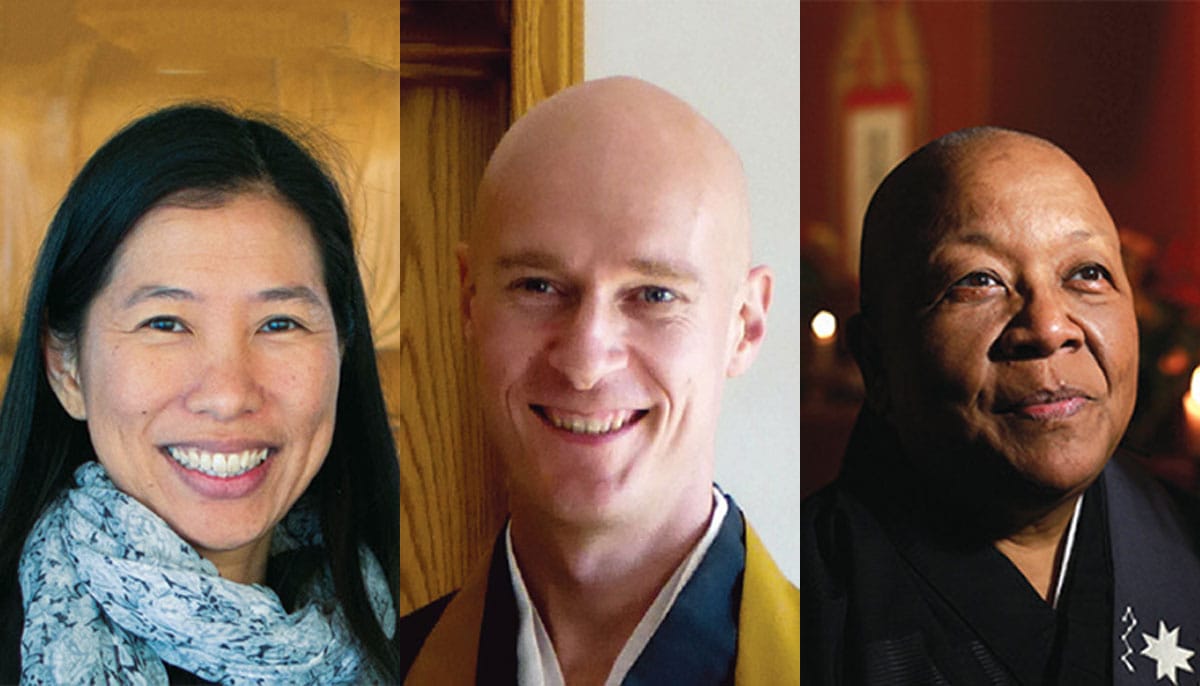Question: How can one “take on the suffering of the world” or practice “for the sake of all beings” without also inflating their own sense of self-importance? As profound as these practices are, they also seem like fodder for the ego.
Rebecca Li: As an antidote to the pernicious arrogance that gives rise to thoughts like “I’m doing something so selfless—aren’t I great?” we can practice gratitude for the opportunity to serve. In particular, we can be grateful for all of the causes and conditions that have made it possible for us to practice and to help other beings through our practice. Such causes and conditions might include the fact that our health, family, and financial situations are not so desperate that we cannot think of anyone else, or perhaps that had the opportunity to study with good teachers who inspire us to practice for the sake of all beings. We can also recognize the direct and indirect supports we continually receive from countless others who make our study and practice possible. In this way, we realize that we practice for the sake of all beings not because we are inherently better than others but because we have been the beneficiaries of all that has come together to make it possible for us to practice in this way. Practicing for all beings is one way we can repay those who love and support us.
Instead of believing we are such great people for helping others, we can thank all beings for allowing us to be of service.
Furthermore, we can practice gratitude for the opportunity to serve. Our desire to help does not obligate anyone else to accept that help. Without the willingness of others to open their hearts to receive us, we would not be able to offer of ourselves. We should also remember that, regardless of whether or not we are successful, our attempts to alleviate others’ suffering also alleviates our own suffering. When we turn our focus toward all beings, we cease in that moment from obsessing over our own difficulties. Instead of believing we are such great people for helping others, we can thank all beings for allowing us to be of service. By cultivating this attitude, we are less likely to succumb to ego-feeding self-importance.
It is gratifying to see someone’s suffering lessened through our efforts. The good feelings that result are encouraging and inspiring and can be useful for sustaining our practice on the path. If we maintain clear awareness of what arises in our minds from moment to moment, with patience and diligence, we can perceive the subtle shift that occurs when these good feelings start to turn into an inflated sense of pride in our own generosity. In such moments, if we can remember to be grateful, this sense of self-aggrandizement will dissolve on its own. This requires diligence. Just because thoughts of self-importance did not arise in the last moment does not mean we no longer need to be vigilant in this moment, or the next.
Kakumyo Lowe-Charde: If we hold back from practicing for the sake of all beings in the belief that doing so might strengthen our own ego conditioning, then all we’ll have left is our ego conditioning. Rather than drawing lines in the sand to distinguish “pure” and “impure” forms of practice, we can simply notice how comforting and reassuring it is when we believe we are on the right side of those lines. And if we persist in noticing, we may discover that the need to draw lines, to create a right and a wrong side, is rooted in fear. If, in a given instant, we can open up and allow ourselves to feel this fear, it will morph into something else—perhaps grief, compassion, or remorse. And when that happens, we increase our capacity for choice.
Over time, as we gain progressively more solid footing in our practice, it becomes easier to resist the most blatant forms of “selfing,” but there are always increasingly subtle layers to peel away. We must all navigate our own personal thicket of delusions, habits, assumptions, biases, and predilections. These days, the realization that I’ve allowed some aspect of my practice to become ego-fodder is all too familiar. But now I’m also more likely to respond with curiosity, gratitude, and humor than with surprise or shame.
Awareness pares away the compulsions of ego that spur on our “me-driven” momentum.
We can’t always steer clear of the subtle snares of ego, but by practicing awareness we can respond to them with equanimity. As dharma practitioners, we cultivate a quality of awareness that allows us to access deeper layers of vow, compassion, perception, and communion. This awareness pares away the compulsions of ego that spur on our verbal, active, “me-driven” momentum. The more frequently we engage with the vastness, luminosity, tender affection, and immediacy of this awareness, the less likely we are to become caught up in conditioned, reactive patterns.
For that to happen, our practice needs to become “lived in.” Have you noticed how places or objects that have been marked by repeated, intimate contact have an unmistakable quality? There is potency in the sweat stain on a bowing mat, the edges of a stone threshold softened by many pilgrims’ feet, the luster of a well-used mala. We, too, can be marked in this way. By continually taking up the practice of awareness, this contact slowly changes how our minds look and feel. Then, when we notice we’re engaging conditioning-driven contortions, we can meet that discovery with awareness and adjust. We can’t do the work of adjusting, though, if we’re unwilling to risk making a misstep. Over time, if we practice awareness with repetition and intention, this practice becomes lived in; it starts to look and feel more and more like a part of us. This, in itself, is bodhisattva activity.
Myokei Caine-Barrett: I suspect we all begin Buddhist practice from a place of ego, with an expectation that we will benefit from it. We believe we will become calmer, more focused, more centered, or maybe that we will learn to maximize our potential and somehow reach a distant shore called nirvana. When we first set out on this path, there is no downside to focusing on the self. We don’t necessarily have the capacity or motivation to “forget the self” yet. It’s only by earnestly engaging with the foundational teachings—the noble truths, the dharma seals, and the great vows—that we develop that capacity. These teachings provide a scaffolding for the construction of a life intent on becoming a buddha.
The first of the four noble truths tell us that life is full of suffering and that the end of suffering is nirvana. The eightfold path offers us a way out of suffering. This path—appropriate speech, appropriate action, and so on—points to the relational nature of Buddhist practice. Our development as practitioners is revealed in our changed relationships, both in the appropriateness of our interactions and the impacts they have. The quality of our interactions becomes a mirror for the depth of our practice.
The dharma seals teach us that all things are impermanent, nothing has a persisting self, and nirvana is tranquility. Applying these principles to our daily lives can prepare us to weather any storm with full knowledge that change is constant. Nothing we experience, even egoistic pride in our own generosity, is a permanent condition.
In sharing the teachings with others, true joy blossoms.
Finally, the four great vows elevate our understanding of suffering, pointing beyond the small world of our own desires and preoccupations. We may at first “fake it until we make it,” but our deepening practice and study will eventually demand a richer and fuller response. Our development as practitioners includes the awakening of compassion and a direct experience of dependent origination, resulting in a truer, more profound understanding of cause and effect. In sharing the teachings with others, true joy blossoms.
By applying these principles to our lives, we can wholeheartedly seek to end the suffering of others, without self-importance. As we do, we come to understand and embody the bodhisattva ideal. The result? Each of us awakens to our own place in the world. We are not alone; we are not without influence and impact. We chose this path. And we are abundantly capable of being changed by it.

